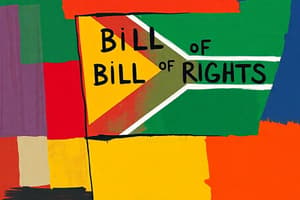Podcast
Questions and Answers
Explain the primary roles of Chapter 9 Institutions in supporting Constitutional Democracy as mentioned in the text?
Explain the primary roles of Chapter 9 Institutions in supporting Constitutional Democracy as mentioned in the text?
The primary roles of Chapter 9 Institutions are to contribute to accountable government by monitoring the government and to transform South Africa into a society in which social justice prevails.
What is the nature of Chapter 9 Institutions as described in the text?
What is the nature of Chapter 9 Institutions as described in the text?
Chapter 9 Institutions are set up to safeguard and promote democracy, established as independent and impartial bodies in terms of section 181 of the Constitution. They are independent non-judicial systems, but also accountable to the National Assembly. They primarily make findings and recommendations, and in some cases issue binding remedial action.
What are the limitations of Chapter 9 Institutions as mentioned in the text?
What are the limitations of Chapter 9 Institutions as mentioned in the text?
Chapter 9 Institutions do not have the power to review and set aside legislation or the actions of the executive; only the courts have that power. They are non-judicial bodies and are important in realizing the state’s duty to realize individual rights in terms of the Constitutional obligations imposed on the state.
List the specific Chapter 9 Institutions mentioned in the text.
List the specific Chapter 9 Institutions mentioned in the text.
What is the function of the South African Human Rights Commission?
What is the function of the South African Human Rights Commission?
Under which section of the Constitution is the Commission for Gender Equality established?
Under which section of the Constitution is the Commission for Gender Equality established?
What are the functions of the Commission for the Promotion and Protection of the Rights of Cultural and Linguistic Communities?
What are the functions of the Commission for the Promotion and Protection of the Rights of Cultural and Linguistic Communities?
What is the main function of the Electoral Commission in South Africa?
What is the main function of the Electoral Commission in South Africa?
What is the role of the Public Protector in state affairs?
What is the role of the Public Protector in state affairs?
What authority do the Public Protector's findings have?
What authority do the Public Protector's findings have?
Who is responsible for appointing members to these institutions?
Who is responsible for appointing members to these institutions?
On what grounds can a member be removed from these institutions?
On what grounds can a member be removed from these institutions?
What are some elements that feature in constitutional litigation?
What are some elements that feature in constitutional litigation?
What is the significance of the case Minister of Health and Others v Treatment Action Campaign Concerned in relation to access to health care services in South Africa?
What is the significance of the case Minister of Health and Others v Treatment Action Campaign Concerned in relation to access to health care services in South Africa?
What was the issue in the case Soobramoney v Minister of Health (Kwa-Zulu Natal) concerning the socio-economic right to healthcare?
What was the issue in the case Soobramoney v Minister of Health (Kwa-Zulu Natal) concerning the socio-economic right to healthcare?
How are socio-economic rights addressed within the South African Constitutional regime?
How are socio-economic rights addressed within the South African Constitutional regime?
What does Section 38 of the Constitution provide for in terms of the enforcement of rights?
What does Section 38 of the Constitution provide for in terms of the enforcement of rights?
What does the term 'competent court' refer to in the context of enforcing rights under the Constitution?
What does the term 'competent court' refer to in the context of enforcing rights under the Constitution?
What additional mechanisms for accessing the Constitutional Court were introduced through amendments to the Constitution in 2012?
What additional mechanisms for accessing the Constitutional Court were introduced through amendments to the Constitution in 2012?
What is a Confirmation of Constitutional invalidity and how is it considered in the context of appropriate relief?
What is a Confirmation of Constitutional invalidity and how is it considered in the context of appropriate relief?
What does Section 172(1) of the Constitution provide in terms of laws declared inconsistent with the constitution?
What does Section 172(1) of the Constitution provide in terms of laws declared inconsistent with the constitution?
How do courts limit the retrospective effect of a declaration of invalidity and correct defects in legislation?
How do courts limit the retrospective effect of a declaration of invalidity and correct defects in legislation?
What is the purpose of 'reading-in' in the context of addressing constitutional invalidity?
What is the purpose of 'reading-in' in the context of addressing constitutional invalidity?
Who has the authority to make an order of Constitutional invalidity according to Section 172(2)(a) of the Constitution?
Who has the authority to make an order of Constitutional invalidity according to Section 172(2)(a) of the Constitution?
How does the topic of Constitutional Jurisdiction overlap with the concepts discussed in the text?
How does the topic of Constitutional Jurisdiction overlap with the concepts discussed in the text?
What is standing in constitutional law and where is it regulated?
What is standing in constitutional law and where is it regulated?
What are the requirements for standing in constitutional law?
What are the requirements for standing in constitutional law?
Who are Amicus Curiae and what is their role in the legal process?
Who are Amicus Curiae and what is their role in the legal process?
What does ripeness refer to in the context of bringing a matter to court?
What does ripeness refer to in the context of bringing a matter to court?
Define mootness and its significance in legal proceedings.
Define mootness and its significance in legal proceedings.
What are the three stages of constitutional litigation and what do they involve?
What are the three stages of constitutional litigation and what do they involve?
What does the right to equality encompass in constitutional law?
What does the right to equality encompass in constitutional law?
Which sections of the constitution are crucial in establishing equality and preventing unfair discrimination?
Which sections of the constitution are crucial in establishing equality and preventing unfair discrimination?
What is the two-stage analysis for unfair discrimination in constitutional law?
What is the two-stage analysis for unfair discrimination in constitutional law?
Under which section of the Constitution is freedom of religion, belief, and conscience guaranteed?
Under which section of the Constitution is freedom of religion, belief, and conscience guaranteed?
What does Section 15 of the South African Constitution allow in terms of religious observances at state institutions?
What does Section 15 of the South African Constitution allow in terms of religious observances at state institutions?
Is the right to religious observance absolute according to the South African Constitution?
Is the right to religious observance absolute according to the South African Constitution?
What is allowed in terms of legislation recognizing marriages and personal/family law under any tradition or religion in South Africa?
What is allowed in terms of legislation recognizing marriages and personal/family law under any tradition or religion in South Africa?
What does the notion of 'reasonable accommodation' require in South Africa?
What does the notion of 'reasonable accommodation' require in South Africa?
According to the South African Constitution, does the prohibition on corporal punishment infringe on the right to freedom of religion, belief, and opinion?
According to the South African Constitution, does the prohibition on corporal punishment infringe on the right to freedom of religion, belief, and opinion?
What must schools do to ensure all students can exercise their right to religion equally according to the South African Constitution?
What must schools do to ensure all students can exercise their right to religion equally according to the South African Constitution?
What freedoms are guaranteed under Section 16 of the South African Constitution?
What freedoms are guaranteed under Section 16 of the South African Constitution?
What are some limitations to freedom of expression according to the South African Constitution?
What are some limitations to freedom of expression according to the South African Constitution?
What privilege does Section 58 grant to members of parliament in South Africa?
What privilege does Section 58 grant to members of parliament in South Africa?
What is required of the state in terms of socio-economic rights according to the South African Constitution?
What is required of the state in terms of socio-economic rights according to the South African Constitution?
How are socio-economic rights debated and considered in South Africa?
How are socio-economic rights debated and considered in South Africa?
In what way has socio-economic rights litigation been valuable in South Africa?
In what way has socio-economic rights litigation been valuable in South Africa?
Study Notes
Constitutional Rights and Obligations in South Africa
- Section 15 does not establish South Africa as a secular state, allowing religious observances at state institutions under certain conditions
- The right to religious observance is not absolute and must be applied equitably and voluntarily
- Legislation recognizing marriages and personal/family law under any tradition or religion is allowed
- The notion of 'reasonable accommodation' requires positive measures to allow all to exercise their rights equally
- The prohibition on corporal punishment did not infringe on the right to freedom of religion, belief, and opinion
- Schools must take positive measures to ensure all students can exercise their right to religion equally
- Section 16 guarantees freedom of expression, including press freedom, information exchange, and academic freedom
- Certain limitations to freedom of expression include propaganda for war and incitement of violence or hatred
- Section 58 grants absolute privilege to members of parliament for statements made during parliamentary proceedings
- Socio-economic rights require the state to respect, protect, promote, and fulfill the rights in the Bill of Rights
- Socio-economic rights are debated politically and legally, with courts considering state obligations
- Socio-economic rights litigation has been valuable in cases like Mazibuko and Others v City of Johannesburg and Others, ensuring access to sufficient water
Studying That Suits You
Use AI to generate personalized quizzes and flashcards to suit your learning preferences.
Related Documents
Description
Test your knowledge of constitutional rights and obligations in South Africa with this quiz. Explore topics such as freedom of religion, expression, and socio-economic rights, and understand the legal framework surrounding these fundamental rights in the country.




